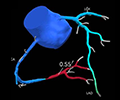
September 2019 Br J Cardiol 2019;26:105–9 doi:10.5837/bjc.2019.029
Paul Brady, Andrew Kelion, Tom Hyde, Edward Barnes, Hazim Rahbi, Andy Beale, Steve Ramcharitar
Abstract

Introduction
In 2010, the UK’s National Institute for Health and Care Excellence (NICE) published a landmark guideline for the investigation of patients with chest pain of recent onset (CG95). This placed a major emphasis on determining the pre-test probability of coronary artery disease (CAD) and then using this information to select an appropriate imaging test, the exact choice depending to some extent on local expertise.1
In November 2016, NICE published an update of CG95, and made substantial changes to the guidelines. As well as eliminating the clinically derived pre-test probability as a means of directing further investigations, NICE
|
Full text
May 2019 Br J Cardiol 2019;26:72–5 doi:10.5837/bjc.2019.022
Max B Sayers, Cristopher M Cook, Takayuki Warisawa, Justin E Davies
Abstract

Introduction – why do we need coronary physiology?
It is increasingly appreciated that only coronary stenoses severe enough to cause myocardial ischaemia should undergo revascularisation. Reliable assessment of stenosis severity is, therefore, vital. For many years, invasive coronary angiography was considered to be the gold-standard test for the identification of flow-limiting coronary artery disease. This was largely due to the ‘oculo-stenotic reflex’ – a powerful stimulus that leads operators to believe that ischaemia must be present based on the severity of the coronary stenosis from visual assessment alone. However, identifying i
|
Full text
November 2012 Br J Cardiol 2012;19:152
BJCardio Staff
Abstract

WOEST: aspirin not required for stent patients on oral anticoagulants
A strategy of using clopidogrel as a single antiplatelet drug for patients receiving a
drug-eluting stent who are also taking an oral anticoagulant appears safe and can reduce bleeding, the results of the WOEST study suggest.
How to treat patients on anticoagulation when they receive a stent is fraught with difficulty as giving the normal dual antiplatelet therapy with aspirin and clopidogrel means they will be taking three anti-clotting agents which could increase bleeding complications to a dangerous level. But no randomised clinical trials have ever investigated whethe
|
Full text



